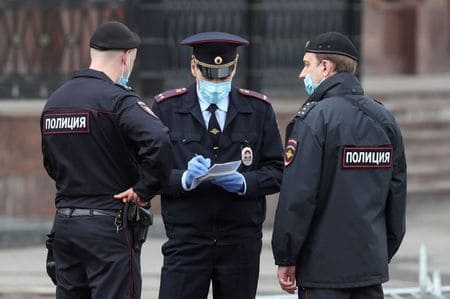By Maria Tsvetkova
MOSCOW (Reuters) – Tests used throughout Russia to determine if someone has the novel coronavirus or not often give the wrong result, Moscow officials said on Thursday, in a statement further calling into question the veracity of official statistics.
The blunt admission by Moscow’s department of health came on the same day as the Russian capital’s mayor, Sergei Sobyanin, said the real number of coronavirus infections was more than triple the official figure.
The disclosure that test kits often wrongly say that people with late stage COVID-19 are free of the disease means the real number of infections in Russia – at 177,160 already the fifth highest in the world – is likely to be even higher.
It also means that people with the virus have been given the all clear by doctors and allowed in some cases to go home where they could infect other people. Reuters has verified at least one case where that happened and the individual infected someone else in their household who later died.
State medical institutions mainly use tests produced by the government-owned Vektor Institute in Siberia. They are based on a so-called polymerase chain reaction, or PCR, which quickly makes copies of a small sample of DNA molecules, the genetic blueprint for life.
“At late stages of the illness, the PCR tests often give false negative results,” Moscow’s health department said in its statement.
Given that failure, it said Moscow, which is far better resourced than other Russian regions, was now sometimes using another test, an antibodies test, in conjunction with the PCR.
Moscow, the epicentre of Russia’s outbreak, accounts for more than half of confirmed cases and deaths. In April, it changed testing policy after doctors complained of inaccurate PCR results and began automatically assuming that anyone with pneumonia was infected.
It was then that it began also carrying out testing for coronavirus antibodies, using kits made by a Dutch company called Inzek International Trading, something it said helped it identify people who had been given the all-clear by PCR tests but actually had the virus.
FLAWS
A document seen by Reuters provides further evidence that the PCR tests are deeply flawed.
It details research carried out by Moscow’s Hospital Number 67 which compared the efficacy of the PCR and antibody tests. In one case, 34 patients had been given the all-clear in PCR tests, but the antibody test rightly identified that 13 of them had the virus, it showed.
In another case, involving 53 patients, results of the two testing methods largely coincided.
Asked to comment on the findings, Russia’s health ministry said coronavirus cases were confirmed not just by testing but also “clinically and epidemiologically” in line with recommendations from the World Health Organization.
A recent coronavirus outbreak in a National Guard unit in the town of Syktyvkar, 1,000 km (620 miles) northeast of Moscow also exposed flaws in the PCR tests.
Russian medics last month tested 151 servicemen in the unit using the Inzek antibody tests and found signs of an ongoing illness caused by the coronavirus among 10 of them, a local medic told Reuters. PCR tests gave all 10 the all-clear however.
Russia’s National Guard denied an outbreak in the unit, local media reported. One of the servicemen, contacted by Reuters, said the unit was quarantined after testing anyway.
Ernest Mezak, a local lawyer at the Public Verdict human rights group, who is conducting an investigation into the unit’s outbreak, said he thought regional leaders were deliberately understating infection numbers, something they deny.
“(President Vladimir) Putin said in April that regional leaders will be held responsible for failure to contain coronavirus outbreaks. This is what I think forces regional officials to understate the spread of coronavirus,” he said.
(Additional reporting by Polina Nikolskaya; Editing by Andrew Osborn and Andrew Cawthorne)


